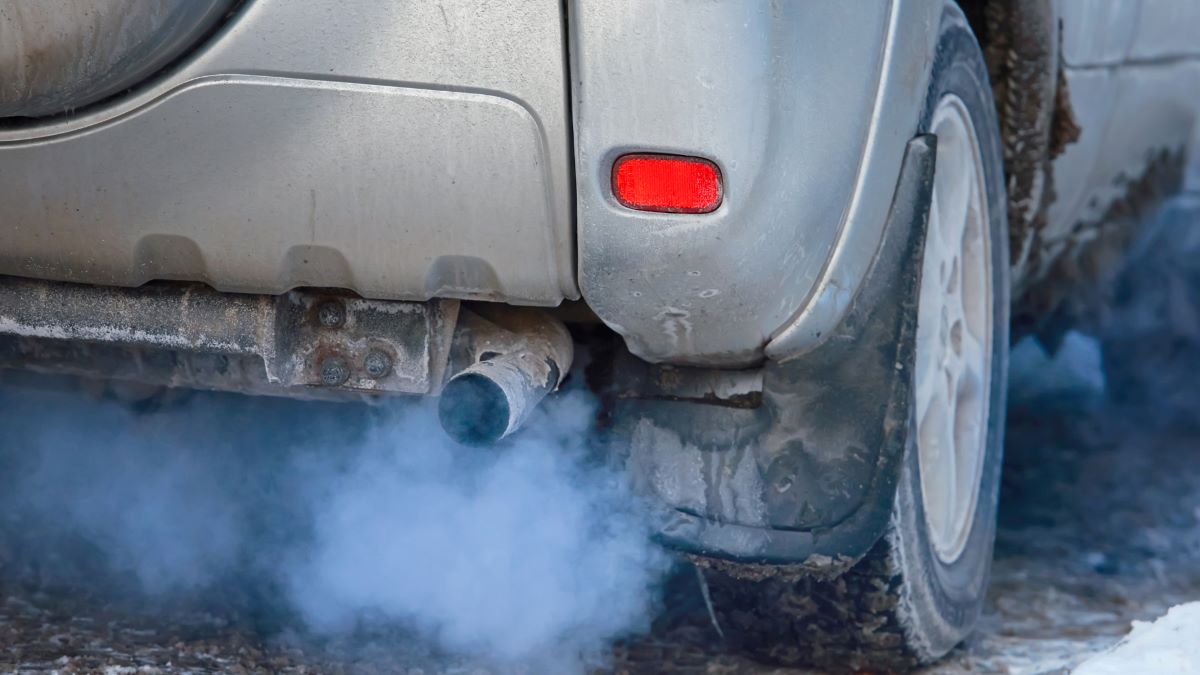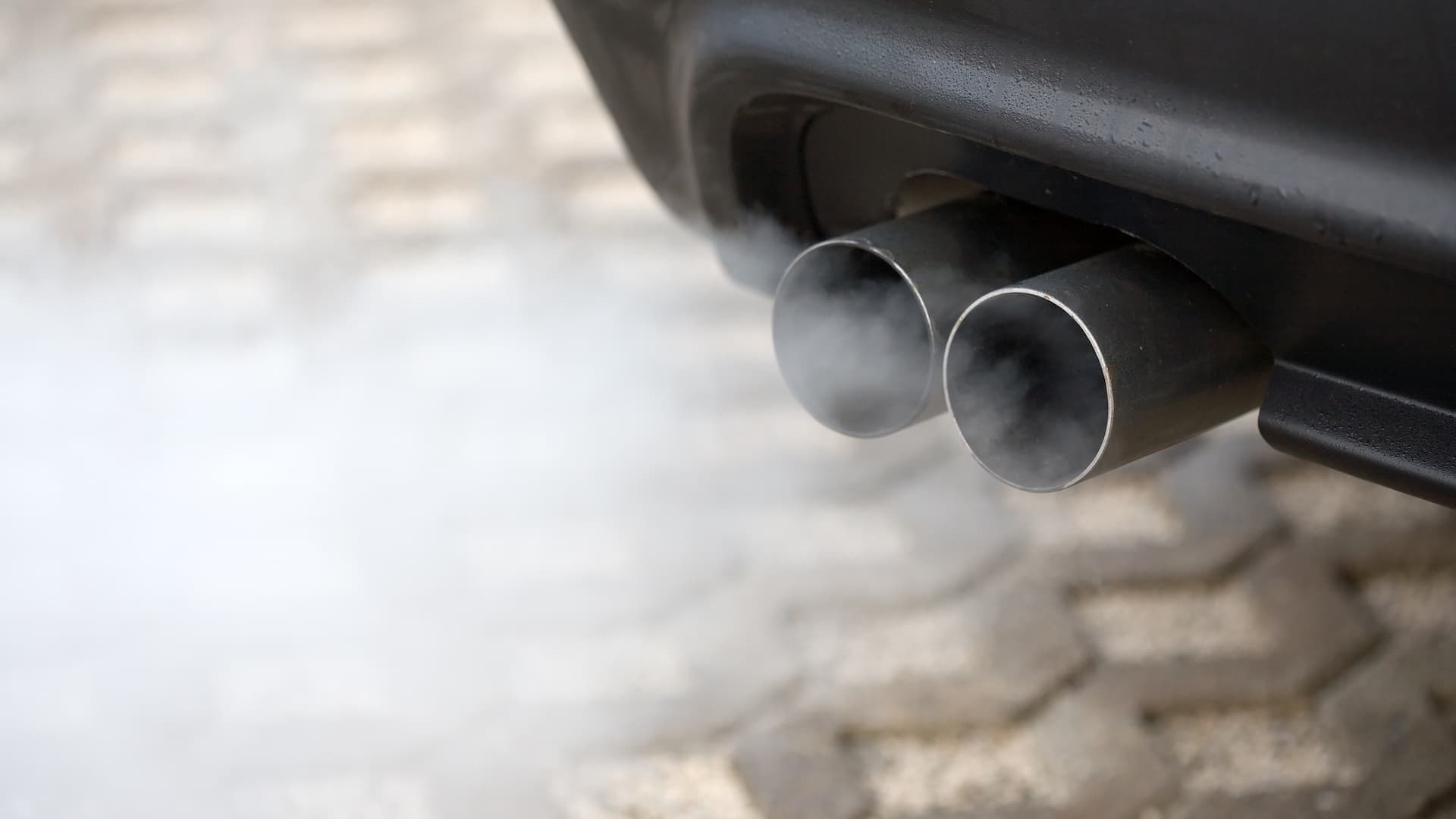When a vehicle experiences a problem, some drivers may recognize it immediately, while others might not notice the early warning signs until the issue escalates.
However, white smoke from the car’s exhaust is one indicator that even new drivers can spot – it’s a clear warning that something is wrong with the engine.
White smoke typically indicates that coolant or water is entering the combustion chamber, often due to a blown head gasket, a cracked engine block, or a damaged cylinder head.
This issue can pose serious risks, as white exhaust smoke may signal dangerous underlying problems.
What Causes White Exhaust Smoke?
White exhaust smoke can arise from various issues, some minor and others more serious. For instance, on cold mornings, the smoke may simply be condensation in the exhaust system, which is entirely normal.
However, persistent white smoke often points to more significant problems, such as a blown head gasket, a cracked engine block, or a damaged cylinder head.
These issues allow coolant or water to infiltrate the combustion chamber.To resolve this, professional repairs are necessary.
If you notice continuous white smoke, it’s essential to have your vehicle inspected by a qualified mechanic immediately to ensure safety and maintain the car’s performance.
Causes of White Smoke From the Exhaust
Blown Head Gasket
A blown head gasket can result in white exhaust smoke by permitting coolant to seep into the combustion chamber.
The head gasket acts as a seal between the engine block and the cylinder head. When the gasket fails, this seal is broken, and coolant leaks into places it shouldn’t.
In the combustion chamber, where the air-fuel mixture ignites to power the engine, the leaked coolant burns alongside the fuel.
This produces white smoke that exits through the exhaust system. A blown head gasket is a serious issue that demands immediate attention, as driving in this condition can lead to severe engine damage.
If you suspect a blown head gasket, it’s vital to have your car inspected and repaired by a professional mechanic promptly to avoid further complications and ensure safe driving.
Damaged Radiator
A damaged radiator can indirectly cause white smoke by leading to engine overheating, which in turn may damage the head gasket. The radiator plays a critical role in cooling the engine.
If it becomes damaged, the engine could overheat, putting stress on the head gasket and other components.
Overheating may cause:
- The head gasket to fail
- Coolant to leak into the combustion chamber
When coolant burns along with fuel, white smoke emerges from the exhaust.
Cracked Engine Block
A crack in the engine block can allow coolant to seep into the combustion chamber, where it mixes with the air-fuel blend and burns off, producing white smoke.
Signs of a cracked engine block include:
- Engine overheating
- Unexplained loss of coolant
- Oil contamination
- Reduced engine performance
If you notice these symptoms, address them immediately to prevent further damage.
A professional inspection can help determine the cause and ensure your vehicle continues to operate safely.
Cracked Cylinder Head
White smoke may also occur if the cylinder head is cracked, allowing coolant to leak into the combustion chamber.
This coolant mixes with the air-fuel mixture and burns, creating white exhaust smoke. Like other causes, this issue requires prompt attention from a mechanic to avoid more significant damage.
Condensation
White smoke from the exhaust is sometimes harmless, particularly on cold mornings. Moisture from the air can collect in the exhaust system, and as the engine heats up, it turns this moisture into steam.
This steam exits the exhaust as white smoke but typically disappears after a few minutes once the car warms up. In such cases, there’s no need for concern, as it’s a natural occurrence.
Foam in Engine Oil
Foam in the engine oil is another potential cause of white smoke. This indicates that coolant has mixed with the oil, often due to a blown head gasket or a cracked engine block.
When coolant enters the combustion chamber and burns with the fuel, it generates white exhaust smoke.
Overheating
An overheating engine can result in white smoke coming from the exhaust. When the engine overheats, critical components such as the head gasket may fail.
A blown head gasket allows coolant to leak into the engine cylinders, where it is burned along with fuel. This process produces thick white smoke from the exhaust.
Additionally, overheating can damage the engine block or cylinder head, causing cracks that lead to further coolant leaks and exacerbate the problem.
Low Coolant
Low coolant levels are another potential cause of white smoke from the exhaust. A significant drop in coolant often signals a leak or a malfunctioning component, such as the water pump or radiator.
When coolant leaks into the combustion chamber, it burns during the engine’s operation, producing white smoke.
Maintaining the coolant system by ensuring it is properly filled and sealed is essential for preventing this issue and keeping the engine cool.

Air in the Cooling System
Air trapped in the cooling system can hinder the flow of coolant, resulting in engine overheating.
If the coolant cannot circulate effectively, it can cause localized overheating and force coolant into areas it should not reach, such as the combustion chamber. This situation often results in white smoke exiting the exhaust.
Air can enter the system due to factors such as:
- A coolant leak
- Improper filling of the coolant
- A faulty radiator cap
Bleeding the air from the cooling system can restore its proper function and prevent further issues.
Is White Smoke Only Caused by Overheating?
If white smoke is coming from your vehicle’s exhaust, there’s no need to panic immediately. Various factors can contribute to this issue. Some common causes include:
- Blown head gasket
- Cracked engine block or cylinder head
- Cold weather
- Malfunctioning or leaking fuel injectors
Understanding the potential cause is essential for diagnosing and resolving the problem effectively.
Why Is There White Smoke From My Exhaust When Accelerating?
White smoke appearing during acceleration is typically a sign of a coolant leak within the engine.
When you press the accelerator, engine pressure increases, forcing coolant into the combustion chamber and resulting in white smoke.
In diesel engines, this issue might also be caused by a faulty turbocharger or a leaking turbo pipe.
If the turbocharger seals fail, coolant or oil may leak into the engine, where it burns off as white smoke during acceleration.
Why Does My Car Emit White Smoke From the Exhaust When Starting?
Seeing white smoke when starting your vehicle doesn’t always indicate a serious problem. In cold weather, condensation can accumulate in the exhaust system, causing temporary white smoke when the car is started.
If this smoke dissipates after the engine warms up, it’s nothing to worry about. However, if the smoke persists, it could signify a coolant leak or a more severe engine issue requiring immediate attention.
What Happens When White Smoke Comes From the Exhaust of a Diesel Car?
In diesel cars, white smoke often signals incomplete combustion, which can occur for several reasons:
- Injector Problems: Faulty or leaking fuel injectors may allow excessive fuel into the combustion chamber, causing white smoke.
- Glow Plug Failure: In cold weather, malfunctioning glow plugs can prevent the engine from properly igniting the fuel, leading to incomplete combustion and white smoke.
- Low Compression: Diesel engines depend on compression to ignite fuel. Compression issues caused by worn piston rings or cylinder walls can lead to incomplete combustion and white smoke.
- Air Induction System Leak: A leak in the air induction system can also cause this issue.
Can I Drive My Car If There’s White Smoke Coming From the Exhaust?
Driving a car with white smoke coming from the exhaust is generally not recommended.
While it may be safe to drive short distances in cases where condensation is the cause, more serious issues, such as a blown head gasket, coolant leaks, or engine damage, can worsen if the car is driven.
Additionally, excessive smoke may violate local emissions laws and indicate that the vehicle is not environmentally compliant.
How to Fix Your Car If You Have White Exhaust Smoke
Fixing white smoke from the exhaust requires addressing its root cause. Common solutions include:
- Head Gasket Replacement: A blown head gasket needs replacement to stop coolant from leaking into the engine.
- Repairing Cracked Components: Cracks in the cylinder head or engine block may require welding or replacing the damaged parts.
- Replacing Faulty Fuel Injectors: Malfunctioning fuel injectors should be cleaned or replaced to ensure proper fuel combustion.
- Coolant System Repairs: Any leaks in the coolant system, such as from the radiator, water pump, or seals, must be located and repaired.
- Air Purging From the Cooling System: Bleeding the air from the cooling system can resolve issues caused by trapped air.
What About Smoke Coming From the Engine?
Smoke emanating directly from the engine is a different issue than smoke from the exhaust. Engine smoke often indicates:
- An oil leak
- Overheating engine components
- Electrical issues
Oil leaks can cause smoke by dripping onto hot engine parts, such as the exhaust manifold. This issue requires immediate attention, as driving with oil leaks or an overheating engine can lead to severe damage.
By addressing the source of white smoke promptly, you can protect your vehicle’s engine and ensure it continues to operate safely and efficiently.
If you observe white smoke from your vehicle’s exhaust, it’s crucial to determine the cause and address it immediately.
Whether it’s a minor issue like condensation or a significant problem such as a cracked engine block, timely professional repairs can prevent further damage and keep your car running safely and efficiently.

